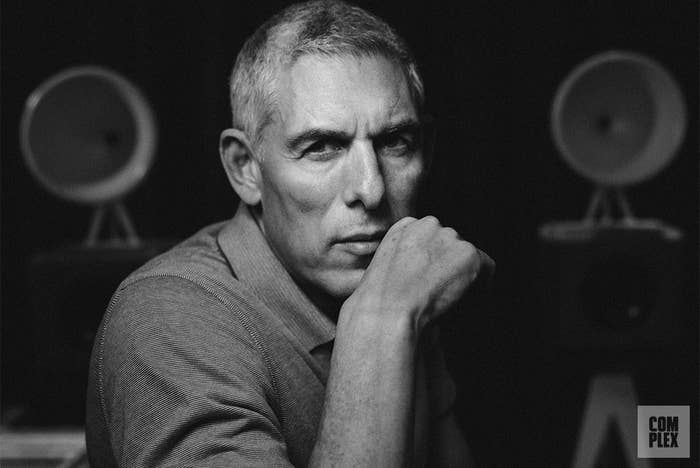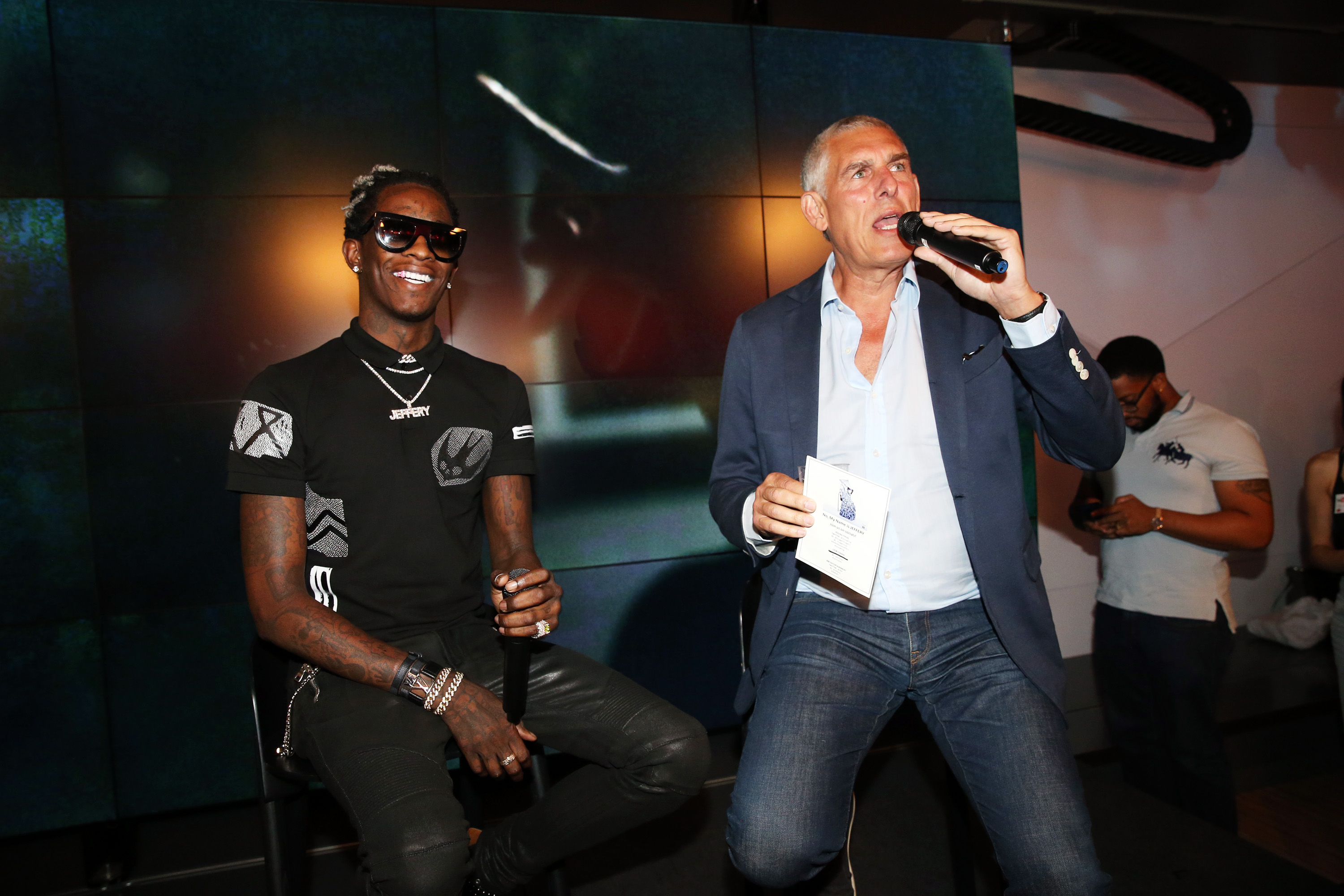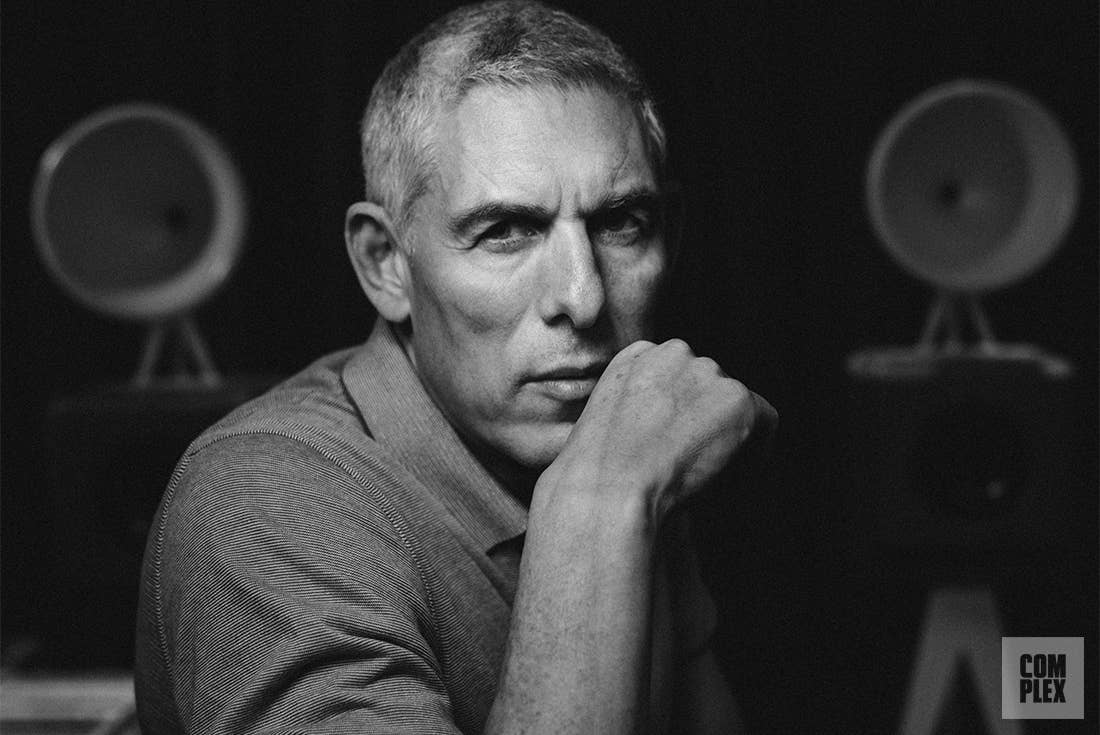
I talked to Lyor Cohen over the phone last Monday, September 19. The objective was to get a few quotes for an upcoming story about 300 Entertainment. The company’s two-year anniversary celebration was set to go down the next night, so I was going to write about the event, the first two years of 300, and the company’s plans for the future.
The story was never supposed to be all about Lyor, but his presence is unavoidable. He’s one of the most powerful and recognizable names in the music industry. He’s held the top spots at Def Jam and Warner Music Group, worked with dozens of A-list artists ranging from LL Cool J to Kanye West, and inked deals with Slick Rick, A Tribe Called Quest, and De La Soul. He’s single-handedly helped shape the hip-hop industry—he’s the one who brokered Run-DMC's legendary endorsement deal with adidas in the ‘80s, before hip-hop was a commercially viable option in the eyes of most major corporations.
After all of this, in 2012, Lyor Cohen founded an independent boutique record label called 300 Entertainment, with three other music industry executives: Kevin Liles, Todd Moscowitz, and Roger Gold. It was an interesting move for Cohen, who had spent years working in the major label system. 300 was well-funded and the four founders had around 100 years of music industry experience between them, but it still seemed like a risk. And risk is something that the music industry has been notoriously averse to, particularly in the uncertain age of streaming.
The message was clear: 300 is small, powerful, willing to adapt to the new landscape, and nimble enough to do it.
Throughout the following years, he’s been the most visible ambassador for the label. He appeared on television speaking about the company, joined Young Thug for press runs, and promoted 300 and its aggressively passionate ethos constantly, whenever he got the chance. The message was clear: 300 is small, powerful, willing to adapt to the new landscape, and nimble enough to do it.
300 Entertainment is now home to an eclectic roster including Young Thug, Fetty Wap, Demo Taped, ASTR, and Rejjie Snow. There are 22 employees of the label, and 36 artists listed on the website, which doesn’t reflect some of the newer and in-progress deals. From the outside, it appears that 300 Entertainment’s first years in business are a success, and that this boutique label approach is well-suited for the new streaming obsessed era of the music industry. Maybe the major label system isn’t the only option. Maybe sometimes, smaller is better.
About a week after the interview, it was announced that Lyor Cohen was hired by one of the largest brands in the world. He’ll be the new Global Head of Music for YouTube, tasked with improving collaboration between the video streaming platform and the record labels. He'll also be navigating how the world’s largest music streaming platform can capitalize on its position, which other corporate behemoths like Apple Music and Spotify are gunning for. Who better than Cohen, the guy who signed YouTube’s first big record licensing deal in 2006, for the job?
But at the time of this interview, just days before the announcement, I didn’t know about this major shift. During the interview, he seemed very open about his passion for 300 and his plans for the company's future. Looking back on it now, I wonder whether or not he knew this change was coming.
Here’s the last interview Lyor Cohen gave before announcing his pending move from 300 Entertainment to YouTube.
What is your proudest moment with 300 so far?
The proudest moment… there have been so many proud moments, I can’t specify one. The proudest moment is probably the fact that our artists are throwing our own anniversary party, which is unusual in an industry where artists are bashing labels.
What do you think is different about 300 and your relationship with the artists?
I think that they feel a sense of purpose with us. They feel like we’re on the cusp of an era, a transitional era, where you’ll see more boutique labels. Not independent like broke independent, but have an independent spirit and a sufficient amount of capital to really make a dent.
The only obstacle is the profound sense of responsibility that I have, TO get it right and make it special. To not fuck it up. –Lyor COhen
What obstacles have you faced?
The only obstacle is the profound sense of responsibility that I have, to get it right and make it special. To not fuck it up. It’s almost the same responsibility when I took over Def Jam, when Rick [Rubin] left. I don’t want be the one known for murdering Def Jam. So, I don’t want to be known for not seizing the opportunity, where streaming is exploding and access to fans is easier and less expensive than it was before.
Do you think that major labels are catching up with the times, or still behind in the streaming world?
I don’t want to talk about the majors. I want to talk about our dream of something that’s small, but powerful. Manageable and effective. Think of us as that crew that got bin Laden. Think of us as Navy SEALs. We just want to get our jobs done. We want to break artists. We want to be respected in the creative community. We want people to think of us in a very positive light.
How many 300 employees are there?
We’re 22 people.
Do you plan on expanding, or is the objective to keep things small?
Yes, we’re in the expansion mode as we speak.
What do you look for in a 300 employee?
Well, they have to submit a playlist. That’s their resume. So first and foremost, they have to like music.
Do you look at those playlists yourself?
Mmhmm. This is a very intimate company. Hopefully we’re signaling a new era, the boutiques, where capital and creative people can come together and build great businesses. People are talking about us, it’s nice. This is a really important time.
I want to talk about our dream of something that’s small, but powerful. Manageable and effective. Think of us as that crew that got Bin Laden.
So you guys have been releasing music for two years now. Are there specific goals that you want to accomplish in the next two years?
After two years, we’ll transform ourselves into a media company. Because we’re really storytellers over here, but we haven’t gotten the chance to tell our story, or our artists’ stories.
Do you plan on doing that in video format?
Yeah, in video format.
What do you look for in a new artist?
We look at truthfulness, far above anything else. And determination and talent.
You have the motto, “Fuck the cake, we want the bands.” What does this mean to you?
Yeah. Fuck the cake, we want the bands. We don’t want to celebrate in the corny, “Hey, this is our anniversary” kind of way. We want the money and the arts. That’s our focus.
Where do you see Young Thug in two years?
I think Young Thug is developing beautifully, and could be shifting things. It’s another branch of rap music.
I saw your Follow The Leader episode on TV, and you advised him to slow down and take more time with his songs. Has he been taking that to heart?
Well, you tell me. Based off this tape, what do you think?
Lyor Cohen's involvement with 300 moving forward is still unclear. According to his PR, he will continue his duties at the label until December 5, and "by that time the leadership will transition his role to a new leadership team." Cohen will remain connected to 300 as he is the single largest individual investor. Fellow founders will remain, and now leaders like Kevin Liles and Todd Moscowitz—who were both once Cohen's interns—will take the reigns.


